"Better Days" and China & Hong Kong at the Oscars
 Saturday, November 28, 2020 at 3:15PM
Saturday, November 28, 2020 at 3:15PM by Nathaniel


Hong Kong has selected Better Days (available to rent on Amazon), to represent them at the 93rd Oscars. Its director Derek Tsang (also known as Tsang Kwok Cheung) first entered the movies as an actor. But for the last decade the now 41 year old talent has been moving behind the camera. (He's the son of the director Eric Tsang who followed a similar path working both sides of the camera). His film is a contemporary crime drama about a bullied teenage girl and a mysterious thug who protects her. It won 8 prizes at the annnual Hong Kong Film Awards.
The Academy Awards have been notoriously resistant to Asian cinema, apart from a 20th century fixation on Japan. Most Asian countries have somewhere between zero to two Oscar nominations, usually not a number that accurately reflects their status in global cinema. Only in the 1990s when Chinese cinema was all the rage at US arthouses, did Oscar come around and then only for a few short years. After the jump at look at China and Hong Kong's track record with Oscar. We're grouping them together, despite how problematic that is politically, because when it comes to the film industries it can be hard to separate them for us Americans across the ocean. That's because the two countries often share the same directors and movie stars. That's reflected in their Oscar submissions...
CHINA
(Submitting since 1979)
33 submissions (they have not yet announced their 2020 submission)
2 nominations
HONG KONG
(Submitting since 1959)
39 submissions
2 nominations
1 additional finalist
KEY SUBMISSIONS - CHINA
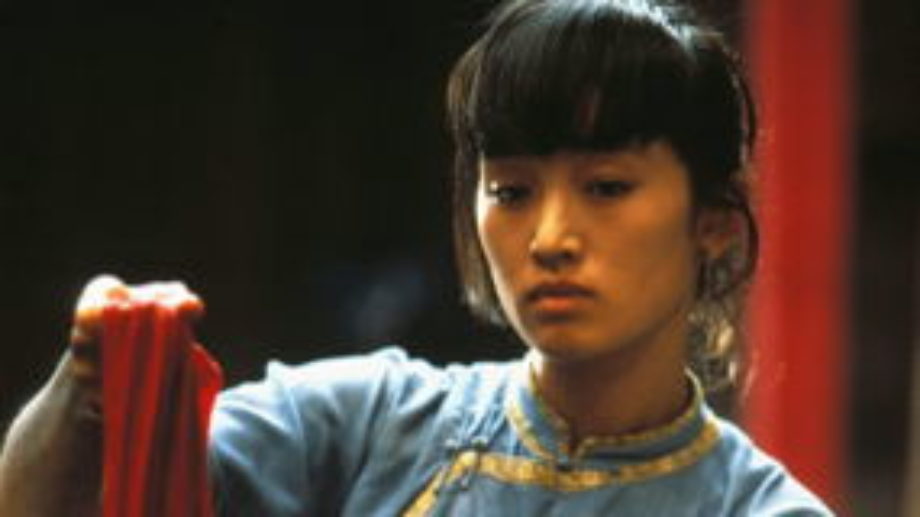 Ju Dou (1990) was the first Chinese Oscar nominee.
Ju Dou (1990) was the first Chinese Oscar nominee.
- Red Sorghum (1988) the first time Zhang Yimou was submitted. Oscar passed.
- Ju Dou (1990) Nominee Zhang Yimou's first of two consecutive nominations in this category, which in combo made Yimou and his then-muse Gong Li international superstars.
- The Story of Qiu Ju (1992) Oscar passed on this Zhang Yhimou/Gong Li classic which caused huge waves at the Venice Film Festival. But the film was well received in its US release the following year picking up the NBR and NSFC wins for Foreign Film as well as a Spirit nomination.
- Hero (2002) Nominee. Strangely it took another two years for this wuxia drama make it to US theaters at which point it was a big hit but ineligible for regular Oscars like Costume Design and Production Design since it had already been a nominee.
 Zhang Ziyi and Takeshi Kaneshiro in "House of Flying Daggers"
Zhang Ziyi and Takeshi Kaneshiro in "House of Flying Daggers"
- House of Flying Daggers (2004) Oscar's foreign committee passed on this stunning Zhang Yimou effort but the film was deservedly nominated in Best Cinematography and it also received a Globe nomination in Foreign film plus nine (!) BAFTA nominations.
- Curse of the Golden Flower (2006) Zhang Yimou and Gong Li famously reunited after years apart for this design spectacle of a royal intrigue action drama. Oscar's foreign committee passed but the film was deservedly nominated in Best Costume Design.
- Dream Weaver: Beijing 2008 (2008) This marks the only time China submitted a documentary in the International category. It was about the build up to the Olympics.
- Aftershock (2010) A blockbuster disaster movie which held the distinction of being the first major IMAX film made outside the US.
- Ne Zha (2019) The first time an animated film was submitted. It was a record-breaking blockbuster in China.
KEY SUBMISSIONS - HONG KONG
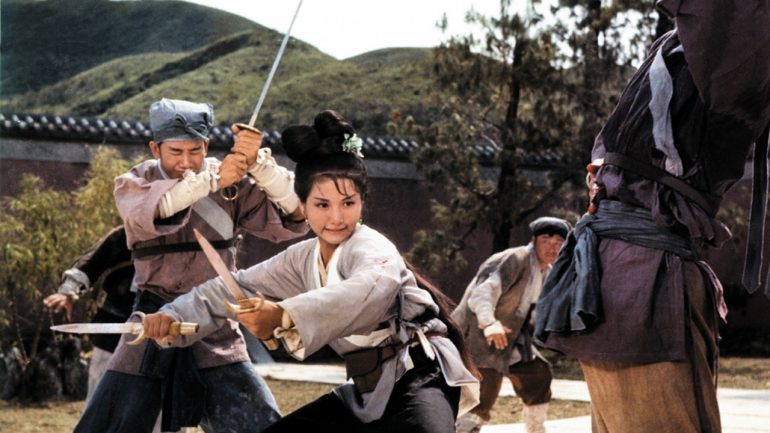 "Come Drink With Me" a very famous wuxia
"Come Drink With Me" a very famous wuxia
- The Love Eterne (1963) Famous opera drama hit from the Shaw Brother studio. Oscar passed.
- Come Drink With Me (1966) King Hu's classic was denied by Oscar. But its reputation lives on.
- The Arch (1969) This film marked the first time Hong Kong or China submitted a female director. Her name was Tan Shu Shuen
- Raise the Red Lantern (1991) Nominee. Zhang Yimou & Gong Li's masterpiece (and that's saying a lot since their other films together are pretty special) and their second consecutive nomination in this category. That it didn't easily win the prize that season is a stain on the Academy
- Farewell My Concubine (1993) Nominee.
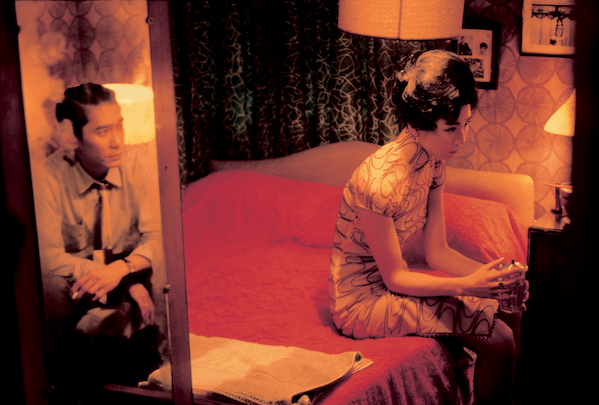 Movies don't get much better than "In the Mood for Love"
Movies don't get much better than "In the Mood for Love"
- In the Mood for Love (2000) One of the worst snubs in Oscar history, any category. Wong Kar-Wai's modern classic picked up two prizes at Cannes (as well as numerous other honors including the EFA, the César, and the NSFC). In the Mood for Love was a critical sensation all over the world and a hit in arthouse US release in 2001. It's impossible not to imagine it making (at least) the finalist list now. Whenever people bemoan "gatekeepers" in art, I feel like they should study this particular Oscar race to see the service gatekeepers, like museum curators or festival programmers, can actually provide whenever you have to select and spotlight a small group of art from hundreds of options. This category's overall nomination list quality has vastly improved since the Executive Committee system took effect 12 years ago after the media gave the Academy a deserved thrashing after the snub of Romania's Palme D'Or winner 4 Months, 3 Weeks and 2 Days.
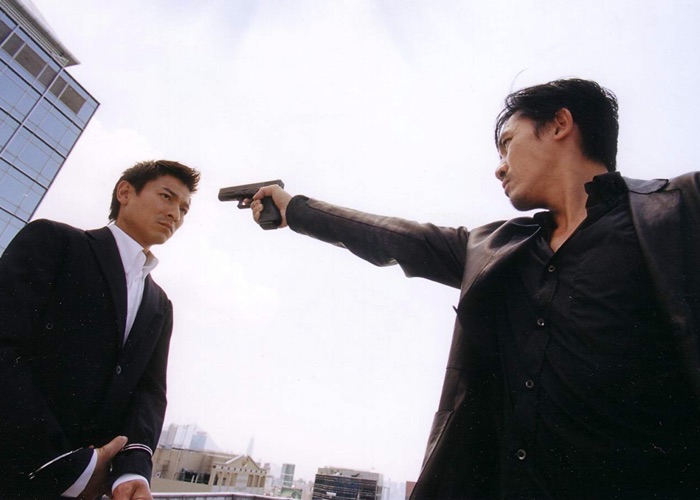
- Infernal Affairs (2003) Oscar passed on this positively cracking crime drama starring Tony Leung Chiu Wai and Andy Lau and then three years later they gave Best Picture to the remake by Martin Scorsese, The Departed, with Leonardo DiCaprio and Matt Damon in those roles. So this omissions feels quite rude in retrospect.
- A Simple Life (2011) Oscar passed on this successful drama from Ann Hui, who is Hong Kong's most often submitted female director.
- The Grandmaster (2013) Finalist. Sadly the foreign committee didn't go all the way with this one but at least this gorgeous Wong Kar-Wai movie about the history of Ip Man received two craft nominations: Costume Design & Cinematography.
Most frequently submitted directors (combo of China & Hong Kong since they've submitted a few of of the same directors over the years)
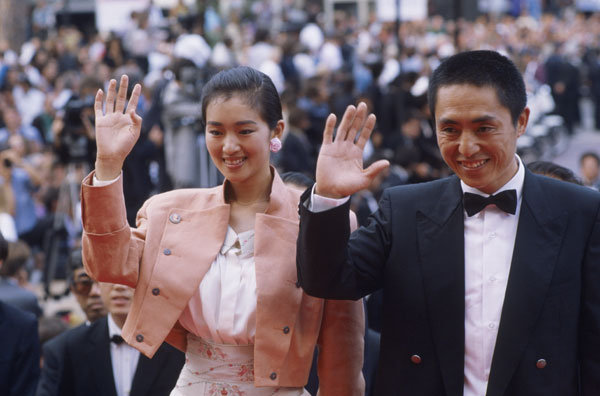 Gong Li and Zhang Yimou at Cannes in May 1990
Gong Li and Zhang Yimou at Cannes in May 1990
- Zhang Yimou (8 submissions, 3 nominated films)
- Chen Kaige (4 submissions, 1 nominated film)
- [TIE] 4 submissions each, none of them nominated: Ann Hui, Feng Xiaogang, and Johnnie To
- Han Hsiang Li (3 submissions, none of them nominated)
- Wong Kar Wai (2 submissions, neither nominated but 1 finalist)
- [TIE] 2 submissions, neither nominated: King Hu, Dante Lam, Wai Ka-Fai, and Yim Ho
Most Oscar-honored Chinese or Chinese descent talent
(Not all from China. Some from Singapore, Taiwan, Hong Kong, etcetera)
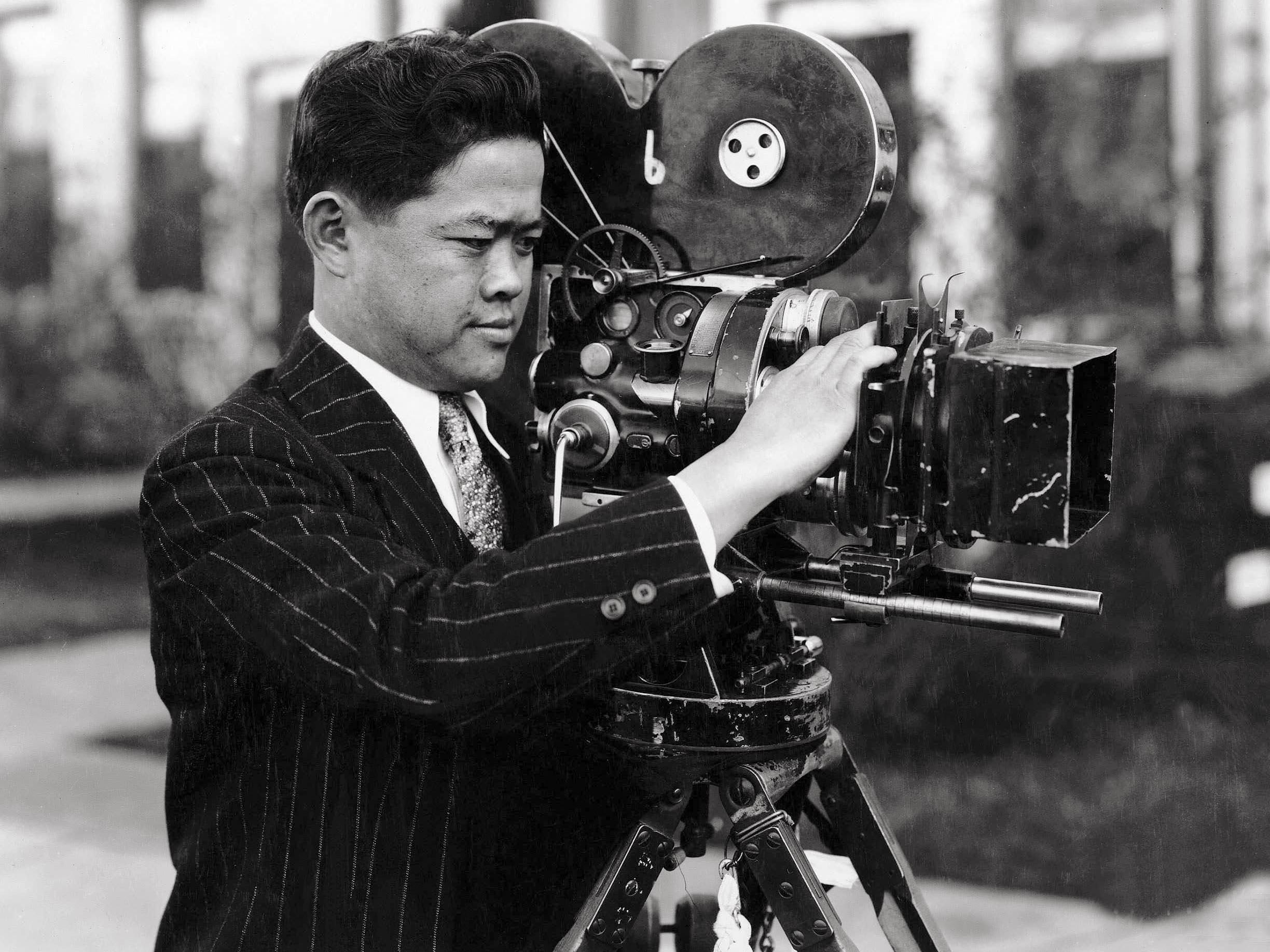 James Wong Howe. One of the all time great cinematographers. He shot Hud, The Old Man and the Sea, The Rose Tattoo, Algiers, The Thin Man, Picnic, and many more...
James Wong Howe. One of the all time great cinematographers. He shot Hud, The Old Man and the Sea, The Rose Tattoo, Algiers, The Thin Man, Picnic, and many more...
- James Wong Howe (Cinematography) - 10 nominations, 2 wins
- Ang Lee (Producer/Director) - 5 nominations, 2 wins PLUS 3 nominations and 1 win in Best International Film*
- Ai-Ling Lee (Sound Mixing/Sound Editing) -4 nominations
- Zhang Yimou (Best International Film) - 3 nominations*
- [TIE] 2 nominations and 1 win each: Tan Dun (Composer) and Ruby Yang (Documentary Short)
* We realize these aren't official nominations for the directors. But they should be!
Several other people have been nominated (or even won) a single time but these lists are only about people who've been in multiple Oscar competitions.
Enjoying these recaps of International Oscar history?
We've done 17 huge overviews this season. Previously we looked at: Brazil, Denmark, France, Germany, Hungary, Iran, Israel, Italy, The Netherlands, Norway, Poland, Portugal, Russia, Spain, Sweden, and Switzerland.



Reader Comments (20)
It's really terrible that the Academy ignored In the mood for love
I love Gong Li-Zhang Yimou movies.
Was Shanghai triad submitted? (It got a nod for its cinematography)
cafg - shanghai triad was not submitted, no.
Keep'em coming!
Isn't Ang Lee from Taiwan?
Wasn't Diving Bell and the Butterfly the major snub that got people to change the system? Outside the controversial plot of 4 weeks, Diving was a bigger hit critically and just missed a best pic, so it's omission I would think was more shocking.
Claudio -- he is. Yes. Chinese descent (both of his parents were from China). And Taiwan's official country name is actually Republic of China. Taiwan, Hong Kong, and China are fairly hard to pull apart cinematically -- at least to this westerner -- since the three countries often share movie stars, language, directors, and even some awards shows! though China is getting more aggressive about this -- boycotting the GOLDEN HORSE AWARDS this past year which usually lean fairly Taiwanese.
KC -- no. No rules changed because of Diving Bell since it was not submitted in the category. Oscar has a hands off policy in terms of what countries submit to them (aside from letting them know the rules) and as far as I know they've never suggested changing the rules to allow more than 1 submission per country or to allow the US to compete. The film was a French/US coproduction with an American director which is I assume why (in part) it was not submitted. The US couldn't submit it (since they aren't allowed to compete in that category) and France chose PERSEPOLIS that year.
Anything from Gong Li and Zhang Yimou is a must and I fucking love Wong Kar-Wai.
Nathaniel R -- Didn't know his parents were from China. Politically, I get the muddle, but I pointed this out because Taiwan gets its own submissions in this Oscar race, separate from China and Hong Kong. Three of Lee's films have been submitted by Taiwan and all of them were nominated.
Maybe I'm being a tiny bit facetious, but I do think that the film history of Taiwan/China/Hong Kong is quite different and makes their industries importantly distinct. for instance, the Fifth Generation is a phenomenon of China that doesn't really, in my mind, reflect itself on the other nations' film industry. Same thing with the radical changes in Taiwanese cinema in the 80s and 90s with the New Taiwanese Cinema and the Second New Wave as a response to cultural schisms and direct competition to productions from China and Hong Kong. To categorize them as all the same feels like saying that Belgian, Swiss, and French cinema are the same.
That being said, I love these overviews of the Best International Feature race. With films from countries we've never seen competing like Lesotho and Sudan, I wonder if we're heading into another record of Oscar submissions. Have also been loving the wealth of women directors being chosen to represent their countries.
Claudio -- i was not categorizing them as "the same". I distinctly stated up front that grouping them together was politically problematic. But I just grouped them in one post to point out that they have many similarities and share movie stars and directors (which they do). I also pointed out in the post that "chinese honors were for people of chinese descent... not necessarily Chinese citizens (if a Chinese-American had had multiple nominations -- i couldn't find anyone who had -- I would have also included them)
Anyway, If i had tried to wholly separate these three film cultures and pretend I, as an american, could tell all the distinct differences in regional cinemas (despite staring at many of the same beloved actor's faces whether I was watching a Hong Kong, Chinese, or Taiwanese movie -- but particularly Takeshi Kaneshiro, Gong Li, Tony Leung Chiu-Wai, Zhang Ziyi, Chang Chen and Andy Lau-- all of whom have starred in submissions from at least two and sometimes all three of those countries -- i believe that would have been dishonest of me.... and in the case of someone like Zhang Yimou it would definitely do them a disservice to pretend in a stats post that they only were part of one country's cinematic culture.
so anyway that's why the post covers both countries. And also because I wanted to point out that China hadn't selected yet.
Oh, hello Derek.
Hong Kong should've won for RAISE THE RED LANTERN and/or FAREWELL MY CONCUBINE. Gong Li should've been nominated for Best Actress for TO LIVE.
And I would pick IN THE MOOD FOR LOVE over CROUCHING TIGER, HIDDEN DRAGON (two strong films though).
Fascinating that they had an Asian phase in the first half of the 1990s that is yet to be replicated. The fact that they have resisted to Asia's rich cinema gets more embarrassing as we go back in time.
I apologize for what, I realize, were probably too heated words on another wonderful post that I should be grateful for. You didn't deserve my grumpy inquiries, especially considering the quality of the information, and I'm sorry for that.
Juan Carlos -- yeah, i *really* don't get their resistancee. It's one thing to naturally respond to European films (we all have things that we culturally respond to with more ease -- nobody grows up in a vacuum) it's another to actively resist large and influential (Hong Kong / China) or artistically lauded film industries (like South Korea until just last season). There are several Asian countries that have never received a single nomination and even huge industries like Hong Kong's have only two nominations or three tops (Taiwan), if their name isn't Japan. It's quite baffling / insane.
The pick of 'Better Days' to represent Hong Kong is a bit controversial though 'Better Days' is co-production film of Hong Kong and China, none of the actor is from Hong Kong and the story background set in the cities in China, thus the film is mainly in Putonghua instead of Cantonese. The film also won multiple major awards in Hong Kong Films Awards and the result was upset for most Hongkongers due to the worsen relationship between the Chinese Government and Hong Kong while some of the Hong Kong audience consider this kind of co-produced should not qualified as a 'Hong Kong film'
As a Hongkonger, I obviously support for local Hong Kong production films like Suk Suk (about a old gay couple), Beyond the Dreams (a romantic box office hit) and My Prince Edward (female director debut) to represent Hong Kong instead of Better Days. In this chaotic political and social moments, I think Hong Kong film industry should take a firm stance to support local Hong Kong film culture.
Travis -- thank you for that perspective. Love hearing more of this. Did any of the local media reveal which films were actually considered before Better Days was chosen?
NATHANIEL R -- Sadly, no. The Federation of Motion Film Producers which is responsible to select the film to represent Hong Kong for Oscars has made terrible choice in last few years, like they pick some mediocre blockbusters 'The White Storm 2', 'Operation Red Sea', 'To the Fore' to represent Hong Kong. I guess the committee pick films with the criteria of high box office gross in China and the fame of the actor and director instead of the film's quality. Though sometimes they made the right choice like choosing 'The Grandmasters, 'Port of Call', 'Mad World' mostly due to the fame of the directors and actors. but they also miss out some much worthy small film picks like 'Suk Suk', 'Trivisa', 'A Family Tour'.
Besides, The Federation of Motion Film Producers support the HK police brutality during the protest last year. It obviously they would make pro-China choices in the selection of representing Hong Kong. It's just so desperate to see the vibrant Hong Kong film industry is corrupting and cold like that.
I'm sorry Nathaniel but you have mistaken Ann Hui for a woman. It's not an anglicized Chinese name (not Anne) but pronounced as Ahn. Fun fact, Ang Lee's real name is also Ann Lee but he avoided the spelling for the same reason!
I also find it interesting that Hong Kong was still able to submit as a political territory given the recent political unrest in the area resulting to pro-mainland China takeover. (forgot to mention this in my previous comment)
Badd - Ann Hui is actually a female director. Ann is just her nickname. The Chinese full name of Ann Hui is Hui On Wah 許鞍華. Ann Hui like to dressed and as a tomboy though. There’s a Hong Kong documentary about Ann Hui called “Keep Rolling” just released in Hong Kong, anyone who interested in Hong Kong films and Ann Hui could watch it. https://youtu.be/7QB0tc6agK0
Thank you for providing such valuable information. I really hope that I will get more updated information in the future.
Since this post is about the International Feature Film category and Asian cinema, I hope it's all right for me to share the video that I made on the Philippines's history in that category, with emphasis on what I believe were good submissions (though as you know we've never been nominated!) and we should have submitted.
https://youtu.be/s4grrehaCnE